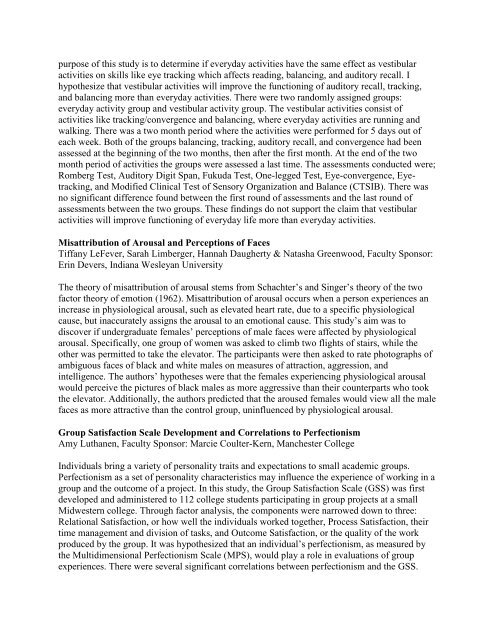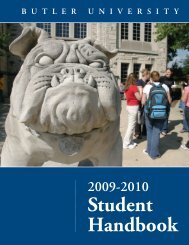Anthropology - Butler University
Anthropology - Butler University
Anthropology - Butler University
You also want an ePaper? Increase the reach of your titles
YUMPU automatically turns print PDFs into web optimized ePapers that Google loves.
purpose of this study is to determine if everyday activities have the same effect as vestibular<br />
activities on skills like eye tracking which affects reading, balancing, and auditory recall. I<br />
hypothesize that vestibular activities will improve the functioning of auditory recall, tracking,<br />
and balancing more than everyday activities. There were two randomly assigned groups:<br />
everyday activity group and vestibular activity group. The vestibular activities consist of<br />
activities like tracking/convergence and balancing, where everyday activities are running and<br />
walking. There was a two month period where the activities were performed for 5 days out of<br />
each week. Both of the groups balancing, tracking, auditory recall, and convergence had been<br />
assessed at the beginning of the two months, then after the first month. At the end of the two<br />
month period of activities the groups were assessed a last time. The assessments conducted were;<br />
Romberg Test, Auditory Digit Span, Fukuda Test, One-legged Test, Eye-convergence, Eyetracking,<br />
and Modified Clinical Test of Sensory Organization and Balance (CTSIB). There was<br />
no significant difference found between the first round of assessments and the last round of<br />
assessments between the two groups. These findings do not support the claim that vestibular<br />
activities will improve functioning of everyday life more than everyday activities.<br />
Misattribution of Arousal and Perceptions of Faces<br />
Tiffany LeFever, Sarah Limberger, Hannah Daugherty & Natasha Greenwood, Faculty Sponsor:<br />
Erin Devers, Indiana Wesleyan <strong>University</strong><br />
The theory of misattribution of arousal stems from Schachter’s and Singer’s theory of the two<br />
factor theory of emotion (1962). Misattribution of arousal occurs when a person experiences an<br />
increase in physiological arousal, such as elevated heart rate, due to a specific physiological<br />
cause, but inaccurately assigns the arousal to an emotional cause. This study’s aim was to<br />
discover if undergraduate females’ perceptions of male faces were affected by physiological<br />
arousal. Specifically, one group of women was asked to climb two flights of stairs, while the<br />
other was permitted to take the elevator. The participants were then asked to rate photographs of<br />
ambiguous faces of black and white males on measures of attraction, aggression, and<br />
intelligence. The authors’ hypotheses were that the females experiencing physiological arousal<br />
would perceive the pictures of black males as more aggressive than their counterparts who took<br />
the elevator. Additionally, the authors predicted that the aroused females would view all the male<br />
faces as more attractive than the control group, uninfluenced by physiological arousal.<br />
Group Satisfaction Scale Development and Correlations to Perfectionism<br />
Amy Luthanen, Faculty Sponsor: Marcie Coulter-Kern, Manchester College<br />
Individuals bring a variety of personality traits and expectations to small academic groups.<br />
Perfectionism as a set of personality characteristics may influence the experience of working in a<br />
group and the outcome of a project. In this study, the Group Satisfaction Scale (GSS) was first<br />
developed and administered to 112 college students participating in group projects at a small<br />
Midwestern college. Through factor analysis, the components were narrowed down to three:<br />
Relational Satisfaction, or how well the individuals worked together, Process Satisfaction, their<br />
time management and division of tasks, and Outcome Satisfaction, or the quality of the work<br />
produced by the group. It was hypothesized that an individual’s perfectionism, as measured by<br />
the Multidimensional Perfectionism Scale (MPS), would play a role in evaluations of group<br />
experiences. There were several significant correlations between perfectionism and the GSS.
















